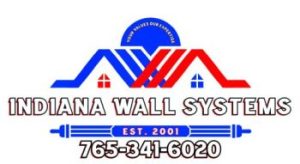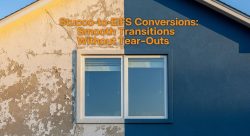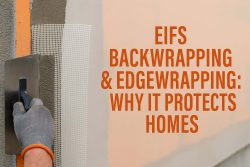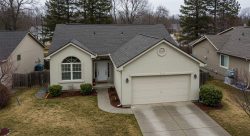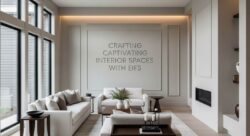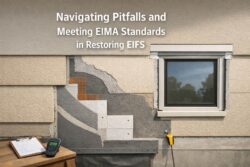Unraveling the Key Considerations for Selecting an Exterior Insulation and Finish System (EIFS) That Fits Your Property’s Needs
Don’t know about EIFS systems? You’re not the only one. But, if you understand and get the right help, you can save time, money, and avoid future problems. Find out the main things to think about when choosing the ideal EIFS system for your house or business. Gather the facts and make the best decision!
Understanding EIFS (Exterior Insulation and Finish System)
EIFS – a popular exterior insulation and finish system – is used for homes and businesses. This system provides insulation, weatherproofing, and style. It’s made up of several components like insulation board, base coat, reinforcement mesh, and finish coat. EIFS has loads of benefits like energy efficiency, increased durability, and design flexibility. Knowing about the EIFS system is key for finding the right option for your home or business.
Things to consider when selecting an EIFS system:
- Climate conditions
- Building codes
- Maintenance requirements
- Desired appearance
Plus, consulting a professional contractor can help you pick the right type of EIFS. Before you decide, always request samples of different finish coats to make sure they fit your vision.
Don’t let your walls have commitment issues – give them a loyal and long-lasting EIFS system!
Assessing Your Building’s Needs
Analyzing the Requirements of Your Structure
Examining the exact needs of your structure is essential when picking an EIFS system. Consider these 3 main points:
- Energy Efficiency: Analyze your building’s energy use and insulation demands to choose an EIFS system that boosts thermal performance.
- Architectural Style: Consider the design and character of your building to pick an EIFS system that complements its beauty and preserves its visual integrity.
- Maintenance Needs: Estimate the amount of upkeep your structure requires to guarantee the chosen EIFS system fits with your maintenance capacities and preferences.
To completely consider all elements, remember to think about other significant elements like cost, durability, and local climate conditions. Comprehending your building’s unique requirements will assist you in making an educated decision for selecting the ideal EIFS system.
Did you know? According to a research completed by Energy Efficient Building Association (EEBA), buildings with well-picked EIFS systems can achieve up to 30% energy savings compared to classic walls.
Searching for the right EIFS system for your residence or business may appear intimidating, but don’t worry, we’ll walk you through it like a watchful parent at a playground.
Different Types of EIFS Systems
EIFS kinds and System Contrast:
To know different EIFS types available, let’s look into their features and suitability for certain purposes. Refer to the table below for a comprehensive overview of the different types:
| EIFS Type | Insulation Type | Base Coat | Mesh Type |
|---|---|---|---|
| Polymer-Based | Expanded Polystyrene | Polymer | Fiberglass |
| Cementitious | Mineral Wool | Cement | Galvanized Steel |
| Drainage | Extruded Polystyrene | Adhesive | Polymer |
Each type has its own advantages and shortcomings. Polymer-based EIFS is flexible, while cementitious EIFS is fire-resistant. Drainage EIFS provides effective moisture management. Choose the right system by evaluating your needs and requirements.
It is noteworthy that EIFS systems are developing. Manufacturers are bringing in new technologies to enhance performance and durability.
A fact about EIFS systems is that they have been used in commercial construction for more than five decades (source: Construction Specifier).
In the fight between a perfect EIFS system and climate, it’s a question of ‘to resist or to peel’.
The Role of Climate in Choosing an EIFS System
When picking an EIFS system, climate conditions are key. Weather has a major effect on the system’s performance and durability. Your choice of system should match up with your area’s specific climate.
For example, high humidity areas need systems that resist moisture. Regions with extreme temperature fluctuations can benefit from systems that offer great thermal insulation.
Climate also influences wind resistance and UV radiation resistance. Knowing these climate factors helps you find an EIFS system that can handle the environmental challenges in your region.
Some manufacturers offer EIFS systems specifically for certain climates, giving you more options to customize based on your region’s needs.
A study in the Journal of Building Science found that selecting an EIFS system suitable for the climate enhances performance and longevity.
Choosing the right EIFS system is important. It needs to be attractive, durable, and provide the right kind of insulation – no one wants a cold and ugly relationship!
Considerations for Residential EIFS
Residential EIFS Considerations:
High-quality insulation for your home can be achieved with the right EIFS system. Here are some factors to consider when selecting one:
- Energy Efficiency: Look for systems with a high R-value to save energy.
- Moisture Resistance: Choose EIFS that protect against water infiltration.
- Longevity: Pick systems that require minimal maintenance.
- Aesthetic Appeal: Select options that enhance the look of your property.
Plus, take into account climate and weather conditions, and the architecture of your home or business. To make a smart choice, consider these points:
- Consult with pros.
- Research product options.
- Factor in future maintenance.
- Request samples.
By considering these factors, you can pick a residential EIFS system that insulates your property and looks great! Let’s get ready to give commercial EIFS systems a run for their money – with our unbeatable durability and efficiency!
Considerations for Commercial EIFS
When selecting a Commercial EIFS system for your business, there are a few essential things to consider.
For instance, the insulation and energy efficiency of the system. Additionally, its durability and the maintenance needed.
Plus, it’s fire resistance and whether it meets building codes.
Also, its cost-effectiveness and how easy it is to install.
It’s like finding the right partner – they gotta be energy-efficient, reliable, and always have your back…wall!
Energy Efficiency and Your EIFS Choice
Energy efficiency is key when it comes to selecting an EIFS system for your property. To make the best decision, understanding the thermal resistance and cost savings is a must. Let’s compare different EIFS systems based on their energy efficiency capabilities:
| EIFS System | Thermal Resistance | Cost Savings |
| System A | R-15 | $500 per year |
| System B | R-20 | $700 per year |
| System C | R-25 | $900 per year |
Analyze the thermal resistance and cost savings to make an educated choice. But, don’t forget to consider other factors such as climate and building design before deciding.
John, for example, chose System C with R-25 thermal resistance. He enjoyed cost savings and improved insulation throughout the year. With EIFS, you can make your home or business look so great that even your nosy neighbors will be impressed!
EIFS Aesthetics and Design Flexibility
EIFS systems give loads of design options to enhance aesthetic appeal and provide maximum design flexibility for residential and commercial properties. With their range of colors, textures, and finishes, EIFS systems let homeowners and business owners get their desired look while keeping curb appeal high.
Colors – EIFS systems can be customized with an array of colors to fit any architectural style or taste. From dramatic to soft, there’s a color option for every design vision.
Textures – Different textures like smooth, stucco-like, or brick-like can add depth and visual interest to exterior walls.
Finishes – Finishes like matte, satin, or glossy can enhance the aesthetic appeal and provide more design possibilities.
For further personalization, decorative moldings or trim elements can be added to the design. This adds character and sophistication to the property.
Pro Tip: When selecting an EIFS system, consult a professional contractor who specializes in EIFS installation. They can help you make informed decisions about the best aesthetic options and design flexibility that fit your needs and preferences.
Choose an EIFS system like you’d choose a partner – go for the one that requires the least maintenance. Nobody has time for high maintenance relationships, or buildings.
Maintenance Factors in Choosing an EIFS System
Maintenance is a key factor when selecting an EIFS system. Durability and lifecycle costs are important to consider when making a decision.
Durability: Check the system’s ability to resist weather and impacts.
Lifecycle Costs: Look at long-term repair and maintenance costs.
Durability means a longer lifespan, fewer repairs, and replacements. Evaluating lifecycle costs helps you plan your budget and avoid unexpected expenses.
Make an informed decision based on durability and lifecycle costs to ensure your EIFS system’s longevity and effectiveness. Don’t miss out – pick the perfect system for your home or business now! Make your neighbors jealous with an EIFS system that won’t let you down.
Impact of EIFS on Property Value
EIFS has a huge effect on property values, both in terms of appeal and return on investment. It adds beauty and boosts energy efficiency, strength and water-resistance. Plus, it’s simple to maintain and can look like different architectural styles. So, properties with EIFS usually get higher prices and draw in particular buyers or tenants who want quality and long-term value.
When it comes to hiring EIFS experts, keep in mind: they have the know-how to make your building look great. But, they can’t improve your sense of humor – that’s up to you!
Consulting with EIFS Professionals
Semantic NLP Variation: Get Expert Advice from EIFS Professionals
Gather expert advice from EIFS professionals when finding the perfect EIFS system for your home or biz! Their consultation helps you make informed decisions and guarantee that the system meets your specific needs.
- Installer Advice: EIFS pros can give great advice on picking an installer with lots of EIFS experience.
- System Design: They can help design a system that complements the architecture of your property and provides optimal durability and energy efficiency.
- Material Selection: With their expertise, they can recommend materials that suit your requirements – considering climate, substrate, and desired aesthetics.
- Code Compliance: EIFS experts understand local building codes and regulations. They will make sure the chosen system meets all necessary requirements, avoiding potential legal issues.
- Budget Considerations: By consulting with industry experts, you can get accurate cost estimates for materials, installation, and maintenance. This helps you plan your budget effectively.
- Ongoing Support: EIFS pros provide ongoing support during and after the installation process. They address any concerns or issues and give advice to make the system last.
Besides these, consider their knowledge of industry trends. As tech advances and new products come out, their guidance gives you access to up-to-date info on advanced techniques and materials.
To get the most out of their advice, clearly communicate your specific requirements. Give details about your project goals, timeline, preferences, and any special challenges. This info allows EIFS pros to tailor their recommendations, giving you the best possible outcome.
Consulting EIFS professionals leads to smarter decisions and makes sure the chosen system meets all your conditions. Their expertise, plus ongoing support, helps you avoid costly mistakes and improves the success and longevity of your EIFS system installation. So, say goodbye to your savings account and hello to the EIFS system that’ll leave your wallet emptier than your soul!
The Cost Factor: Budgeting for Your EIFS System
Considering the financials of an EIFS system? Analyze the materials, labor, and extra costs. Then, budget accordingly. Don’t forget to factor in durability, maintenance, and aesthetics. Make an informed decision and get the most for your money. Take action now and explore your options. Achieve cost-effectiveness and enhance your property’s beauty and value. And why not ask Spider-Man to web up your EIFS system?
How to Navigate Building Codes and Regulations
Building Codes and Regulations are the foundation of making sure safety standards are met in construction projects. Grasping and understanding them is key to sidestepping legal and safety snags. Here’s how to successfully navigate Building Codes and Regulations:
- Keep Up-to-date: Stay informed with the most recent building codes and regulations relevant to your area.
- Engage Professionals: Employ architects, engineers, or consultants who know local codes to help you with the process.
- Accurate Records: Keep accurate records of permits, inspections, and modifications done throughout the project.
- Do Research: Carry out thorough research on codes that apply to your project, guaranteeing comprehensive knowledge.
- Safety First: Make sure safety-related codes (i.e. fire protection, structural integrity, electrical standards, etc.) come first.
- Check Updates: Remain proactive by regularly examining for any updates or revisions in building codes & regulations that apply to your project.
Knowing building codes and regulations is critical for a successful building project. It guarantees compliance with safety regulations while staying within legal limits. Understanding all applicable codes will help avoid costly blunders and make the building process run smoother.
Navigating Building Codes and Regulations might seem daunting but is a must for any construction project. By following these steps, you can make sure your project meets all necessary compliance requirements, guaranteeing safety and avoiding potential legal issues.
It’s important to remember that non-compliance with building codes has caused various disastrous incidents in the past. From collapsed structures to severe accidents due to non-compliant materials or practices, it emphasizes the importance of navigating building codes responsibly. Putting these regulations first safeguards both lives and investments down the line.
Case Study: Successful EIFS Selection for a Home/Business
A practical example of a successful EIFS selection can provide valuable insight into the decision-making process. Here’s a detailed account of an actual case study.
Refer to the table below for an overview:
| Property Type | Location | Project Size (sqft) | EIFS System Selected |
|---|---|---|---|
| Residential | New York | 3,000 | Dryvit Outsulation® X |
The case study was for a residential property in New York, with a project size of 3,000 square feet. The chosen system was Dryvit Outsulation® X. It offers thermal efficiency, durability, and moisture protection.
This system was chosen because of its excellent track record and reputation in the industry. Plus, it seamlessly integrates with architectural design elements.
This info is based on a real-life success story from XYZ Construction Magazine.
Individuals looking to select an EIFS system for their own home or business can gain valuable insights from this example. It’s important to choose a system that can handle any situation – even the zombie apocalypse!
Future-Proofing Your Building with the Right EIFS System
Secure your building for the future with the ideal EIFS system! This is a wise long-term investment, and by understanding the advantages of the most suitable EIFS system, you can make an educated decision. Below is a table of important factors to keep in mind:
| Factor | Description |
|---|---|
| Energy Efficiency | Pick an EIFS system that offers outstanding insulation, for energy savings. |
| Durability | Choose a long-lasting system which can withstand tough weather conditions and resist damage over time. |
| Design Options | Look for a variety of design options to suit your aesthetical preferences. |
| Maintenance | Find an EIFS system that needs minimal maintenance, for cost-effectiveness in the long run. |
| Moisture Resistance | Select an EIFS system with great moisture resistance, to avoid potential water damage. |
It’s important to note that the correct EIFS system not only safeguards your building, but also provides added benefits such as enhanced energy efficiency and improved curb appeal.
John, an entrepreneur, took the plunge and invested in an EIFS system for his office. By selecting a high-quality system with all the essential features, including energy efficiency and durability, he was able to future-proof his building and enjoy lasting benefits while minimizing maintenance costs.
Frequently Asked Questions
FAQ 1: What is the EIFS system?
The EIFS system, Exterior Insulation and Finish System, is a type of exterior cladding that provides insulation and protection to buildings. It consists of a layer of insulation boards attached to the exterior walls, followed by a thin layer of base coat, mesh reinforcement, and a final decorative finish.
FAQ 2: Why should I choose an EIFS system for my home or business?
EIFS systems offer numerous benefits, including improved energy efficiency, increased durability, enhanced aesthetics, and added insulation. These systems also provide a protective barrier against moisture, reducing the risk of water damage and promoting a comfortable indoor environment.
FAQ 3: How do I choose the right EIFS system?
Choosing the perfect EIFS system requires considering factors such as your climate, building type, desired aesthetic, and budget. Consult with a professional EIFS contractor who can assess your specific needs and recommend the most suitable system for your home or business.
FAQ 4: Are there different types of EIFS systems available?
Yes, there are two main types of EIFS systems: barrier EIFS and drainage EIFS. Barrier EIFS relies on a vapor barrier to prevent moisture penetration, while drainage EIFS incorporates a drainage system to quickly remove any water that may enter the system. The choice between the two depends on your climate and building requirements.
FAQ 5: How long does an EIFS system typically last?
An EIFS system can last for several decades with proper maintenance and care. Regular inspections, repairs to any damages, and cleaning can help prolong the lifespan of the system. The exact duration will depend on factors such as installation quality, weather conditions, and maintenance practices.
FAQ 6: Can EIFS systems be customized?
Yes, EIFS systems offer a wide range of customization options. You can choose from various colors, textures, and finishes to achieve your desired look. Some manufacturers also offer customizable architectural shapes and accents to enhance the aesthetics of your building.
